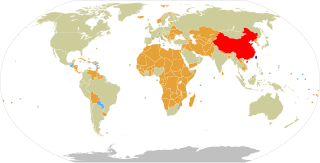
Foreign relations of the Republic of China (ROC), more commonly known as Taiwan, are accomplished by efforts of the Ministry of Foreign Affairs of the Republic of China, a cabinet-level ministry of the Government of the Republic of China. As of January 2024, the ROC has formal diplomatic relations with 11 of the 193 United Nations member states and with the Holy See, which governs the Vatican City State. In addition to these relations, the ROC also maintains unofficial relations with 59 UN member states, one self-declared state (Somaliland), three territories (Guam, Hong Kong, and Macau), and the European Union via its representative offices and consulates. In 2021, the Government of the Republic of China had the 33rd largest diplomatic network in the world with 110 offices.
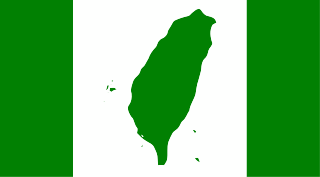
The Taiwan independence movement is a political movement which advocates the formal declaration of an independent and sovereign Taiwanese state, as opposed to Chinese unification or the status quo in Cross-Strait relations.
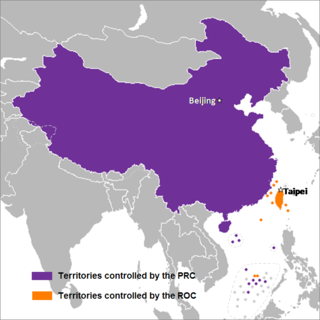
Chinese unification, also known as Cross-Strait unification or Chinese reunification, is the potential unification of territories currently controlled, or claimed, by the People's Republic of China and the Republic of China ("Taiwan") under one political entity, possibly the formation of a political union between the two republics. Together with full Taiwan independence, unification is one of the main proposals to address questions on the political status of Taiwan, which is a central focus of Cross-Strait relations.
The political status of Taiwan or the Taiwan issue is an ongoing geopolitical dispute about Taiwan, currently controlled by the Republic of China (ROC), that arose in the mid-twentieth century. Originally based in mainland China before and during World War II, the ROC government retreated to Taiwan in 1949 after the Chinese Communist Party (CCP) won the Chinese Civil War and established the People's Republic of China (PRC). Since then, the effective jurisdiction of the ROC has been limited to Taiwan, Penghu, Kinmen, Matsu, and smaller islands.
One China is a phrase describing the relationship between the People's Republic of China (PRC) based on Mainland China, and the Republic of China (ROC) based on Taiwan Area. "One China" asserts that there is only one de jure Chinese nation despite the de facto division between the two rival governments in the aftermath of the Chinese Civil War. The term may refer, in alphabetical order, to one of the following:

The National Day of the Republic of China, also referred to as Double Ten Day or Double Tenth Day, is a public holiday on 10 October, now held annually as national day in the Republic of China. It commemorates the start of the Wuchang Uprising on 10 October 1911 which ultimately led to the establishment of the Republic of China on 1 January 1912, and the collapse of the imperial Qing dynasty, ending 2,133 years of imperial rule of China since the Qin dynasty. The day was once held as public holiday in mainland China during the Mainland Period of the ROC before 1949. The subsequent People's Republic of China continues to observe the Anniversary of the Xinhai Revolution at the same date but not as a public holiday, which emphasize more on its revolutionary characteristics as commemoration of a historical event rather than celebration to the founding of the Republic of China.

The flag of the Republic of China, commonly called the flag of Taiwan, consists of a red field with a blue canton bearing a white disk surrounded by twelve triangles; said symbols symbolize the sun and rays of light emanating from it, respectively.
"Chinese Taipei" is the term used in various international organizations and tournaments for groups or delegations representing the Republic of China (ROC), a country commonly known as Taiwan.
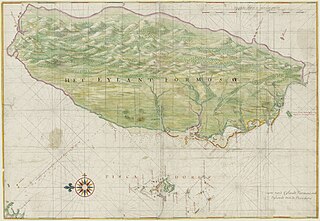
As a result of the surrender and occupation of Japan at the end of World War II, the islands of Taiwan and Penghu were placed under the governance of the Republic of China (ROC), ruled by the Kuomintang (KMT), on 25 October 1945. Following the February 28 massacre in 1947, martial law was declared in 1949 by the Governor of Taiwan, Chen Cheng, and the ROC Ministry of National Defense. Following the end of the Chinese Civil War in 1949, the ROC government retreated from the mainland as the Chinese Communist Party (CCP) proclaimed the establishment of the People's Republic of China. The KMT retreated to Taiwan and declared Taipei the temporary capital of the ROC. For many years, the ROC and PRC each continued to claim in the diplomatic arena to be the sole legitimate government of "China". In 1971, the United Nations expelled the ROC and replaced it with the PRC.

Timothy Sylvester Harris is a Saint Kittitian and Nevisian politician, who served as the third prime minister of Saint Kitts and Nevis from 2015 to 2022. He previously served as Minister of Foreign Affairs from 10 August 2001 to 25 January 2008, as Minister of Finance from 2008 to 2010, and as Senior Minister and Minister for Agriculture from 2010 to 2013.
The 1992 Consensus is a political term referring to the alleged outcome of a meeting in 1992 between the semiofficial representatives of the Chinese Communist Party (CCP)-led People's Republic of China (PRC) in mainland China and the Kuomintang (KMT)-led Republic of China (ROC) on Taiwan. They are often credited as creating a diplomatic basis for semi-official cross-strait exchanges which began in the early 1990s and is a precondition set by the PRC for engaging in cross-strait dialogue.

The concept of Two Chinas refers to the political divide between the People's Republic of China (PRC) and the Republic of China (ROC). The PRC was established in 1949 by the Chinese Communist Party, while the ROC was founded in 1912 and retreated to Taiwan after losing the Chinese Civil War.

The Ministry of Foreign Affairs is a cabinet-level ministry of Taiwan, officially the Republic of China (ROC), and is responsible for the ROC's diplomacy and foreign relations. It is headquartered in the capital Taipei. The incumbent minister is Lin Chia-lung, who took office in 2024 and is a member of the Democratic Progressive Party.

The Republic of China (ROC) took part in the opening ceremony of the 1924 Summer Olympics, but its four athletes, all of whom were tennis players, withdrew from competition. The ROC participated in its first Olympic Games in 1932 under the name of China. After the World War II, the ROC competed at the 1948 Summer Olympics. The ROC delegation at the 1948 Summer Games is the only ROC delegation composed of athletes from both mainland China and island of Taiwan in Olympic history. In 1932 and 1936, athletes from the island of Taiwan competed as part of the team of Japan.

The Order of the Cloud and Banner also known as the Order of the Resplendent Banner is a military award of the Republic of China. It was instituted on June 15, 1935 and is awarded in nine grades for contributions to national security. The insignia of the order features a fluttering yellow flag, surrounded by white clouds on a blue field. This image is surrounded by golden rays.
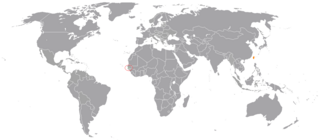
Gambia–Taiwan relations refers to the historical relationship between The Gambia and Republic of China (ROC). Gambia officially recognized Taiwan in 1996 and the People's Republic of China ended recognition for Gambia. On 14 November 2013, Gambian President Yahya Jammeh announced the breaking of diplomatic ties with Taiwan. ROC President Ma Ying-jeou officially terminated ties with Gambia on 18 November 2013 as a response.

Fredrick F. Chien, or Fred Chien, Chien Foo, is a retired Taiwanese diplomat and politician who served as the President of the Republic of China Control Yuan from 1999 to 2005. After graduating from Yale University, he assumed a series of governmental positions include Director-General of the Government Information Office from 1972 to 1975, Republic of China Representative to the United States from 1982 to 1988, Chairman of the Council for Economic Planning and Development from 1988 to 1990, and Minister of Foreign Affairs from 1990 to 1996. He was also the Speaker of the National Assembly between 1996 and 1999.

The Order of Propitious Clouds is a civilian order of the Republic of China (Taiwan). The center of the medal features a picture of clouds, as a token of auspiciousness. This order was instituted in 1941 and classified into nine ranks. As with other orders, both citizens of the Republic of China and foreigners can be awarded the Order of Propitious Clouds.











